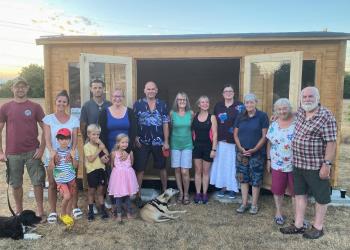
Grants available to help people grow their own
Following its success last year, a grant funding scheme has reopened to encourage people to have a go at growing their own food.
To tackle rising food and energy prices, East Suffolk Council’s 'Field to Fork' grant scheme reopened on 1 April. The scheme provides grants of up to £2,000 to community farms, allotments and gardens to expand their capacity and engage local people with 'grow and eat' projects that will feed communities and help people stay active and connected.
Nicole Rickard, East Suffolk Council’s Head of Communities and Leisure said: “We want to help people feel more confident with growing their own food, which can help save money and help people make healthier food choices. Our Field to Fork grants enable community gardens and allotments to engage with more people, encouraging them to get involved and learn more about the huge physical and mental health benefits of growing your own.”
One of the recipients of a Field to Fork grant last year was Wild About Campsea, an informal group of wildlife-friendly gardening enthusiasts who live in Campsea Ashe. Formed after the Covid-19 pandemic, the group encourages residents of the village to improve biodiversity in their gardens at the same time as growing their own food. They work with Campsea Ashe Parish Council and have established a demonstration community garden on the village recreation ground. The group aims to increase biodiversity, food resilience and community cohesion, as well as promoting the physical and mental health benefits of gardening.
Peter Marett from Wild About Campsea said: “Having received a Boost Grant and a Field to Fork grant from East Suffolk Council, we were able to build raised beds, build a cabin as a workshop and store, and construct compost bins to recycle our waste. Recently, we erected pergolas on either side of the cabin so we can demonstrate space-saving vertical gardening.
“Last year we grew our first crop of fruit, vegetables and flowers and this year, just as the last leeks and kalettes were harvested, we’ve been pulling our first crop of rhubarb and seen our first salad crops emerge in our new hot bed, thanks to the heat produced by a trailer load of fresh horse manure donated by Bracken Farm in neighbouring Tunstall. Our open events have also involved learning about the benefits of growing your own, about edible flowers and ‘weeds’, about foraging, about hügelkultur, and ‘square foot gardening’ in small spaces. We’ve also constructed hedgehog houses, built bug hotels and woven willow bird feeders as well as involving visitors in building take-away wooden planters in which to grow their own vegetables and salads.
“We have learned more from each other about growing food, have made new friends and feel fitter. We don’t have a formal membership but encourage villagers to get involved as and when they can. Produce is shared among our volunteers and with passers-by who show an interest, as well as with anyone we are aware of who is in need. We try to inform the community when crops are ready and encourage them to come along and help themselves. Some of us are present at the Community Garden every Sunday afternoon during the growing season to help.
“We’ve all enjoyed growing and eating the produce, we’ve benefitted from the exercise, and we’ve made good friends. But perhaps most of all we’ve seen the children sowing, picking and podding peas and learning that there is more to food than a supermarket tin or packet.”
As part of the Field to Fork scheme, 1,900 free growing kits were made available for residents to collect last month, each one containing compost pellets, seeds and free access to Groundwork East’s online GROW Programme.
Applications for these grants are now closed.







